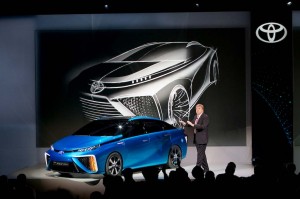
Toyota's Bob Carter reveals the FCV hydrogen car concept vehicle at CES. Carter thinks the FCV could be the next Prius.
Despite the skepticism of some notable critics, the fuel cell represents an emerging of enormous potential as source of power for automobiles. In fact, one company believes that fuel-cell technology is going follow the same arc as hybrids: Toyota.
Robert Carter, senior vice president of Toyota Motor Sales USA, said in a speech to the Automotive News World Congress, automakers must respond to long-term needs “of our customers, our society, and our environment” and fuel cells hold enormous potential, which is the key reason why Toyota has introduced a fuel cell vehicle it plans to sell or lease to consumers in the United States next year.
“Now, I realize there is no shortage of naysayers regarding the viability of this technology and the infrastructure to support it,” Carter said. “Personally, I don’t care what Elon (Musk of Tesla) or Carlos (Ghosn of Nissan) say about fuel cells. If they want to ‘plug in and tune out’ other technologies, that’s fine,” he said.

A production version of the Toyota FCV undergoing cold weather testing - sub-freezing temperatures used to be a problem for fuel-cell vehicles.
“It reminds me of all the head scratching when Toyota made a commitment to hybrid technology back when gasoline was a buck a gallon,” he said. “The Prius was dismissed as a PR gimmick and a science experiment. Well, we’ve since sold over 2.2 million hybrids in the U.S., and nearly 6 million sales worldwide.”
Carter added while hybrids and other alternative powertrain vehicles are still a small part of the overall market, they are growing and totaled nearly 600,000 units last year. “In fact, if you counted gas/electric hybrids…pure electrics…and the trickle of fuel cell vehicles as a segment in 2013, it would be the 7th largest segment out of 21,” he said.
“Did you happen to see the headline the other day that said, ‘China Vehicle Sales Beat 20 Million as Smog Chokes Cities?’ It really brings home the harsh reality that if we want to continue to grow as an industry, we must find ways so cars will work in harmony with our environment,” Carter said.
Carter said Toyota’s fuel-cell program builds on the company’s hybrid leadership and developing pioneer technology to continue being an environmental leader.
In addition, it would have been the second-fastest growing segment in 2013 increasing by more than 17% better than the hot-selling full-size pickup segment, Carter said. “That isn’t smoke and mirrors,” Carter said.
“Ten years from now, I have a hunch our fuel cell vehicle will be viewed in similar terms. We truly believe it has the same potential as the first Prius,” he added.
“We’ve been working on this technology since 1992,” he said. “Trust me, Toyota would not have continued on this path for this long if it didn’t make good business sense.
Carter added fuel cell vehicles offer several advantages since they drive like electric cars but can be refueled like gasoline cars.
“They’re safe. In testing, we fired small-caliber bullets at the hydrogen tank and they just bounced off it. It took a 50-caliber armor-piercing bullet to penetrate the shell,” he said. “And, even then, it just left hole and the hydrogen simply leaked out.”
(Daimler AG’s Zetsche not sold on fuel cell viability. For more, Click Here.)
They’re also viable in real-life conditions, he said.
Toyota has tested fuel cell vehicle in the deep freeze of Yellowknife, Canada, the stifling heat of Death Valley, the high altitude of the Rocky Mountains, even the steep hills of San Francisco.
Fuel cell vehicles will be cost-effective, he predicted. With economies of scale, we’re confident a fuel cell vehicle’s MSRP will eventually be on par with today’s plug-in hybrids.
(Click Here to look at Toyota’s “passionate” design future.)
Meanwhile, the main feedstock for producing hydrogen will be natural gas, which is in abundant supply in this country, he said. Toyota also has been exploring alternative hydrogen sources, including methane emitted from trash dumps, landfills, waste-treatment plants, farms, and ranches.
“And since a fuel cell is more efficient to operate than a gasoline engine, it requires less fuel to travel the same distance with zero emissions,” he added.
